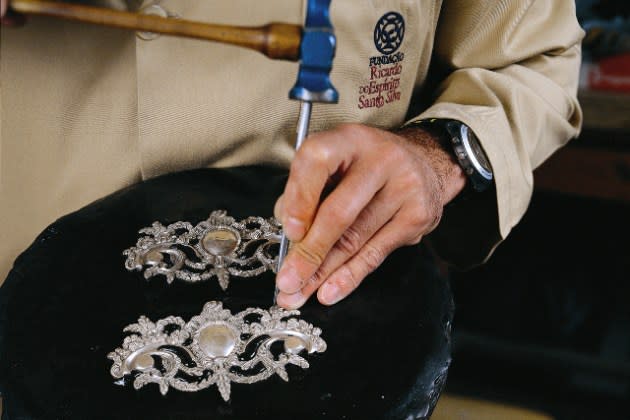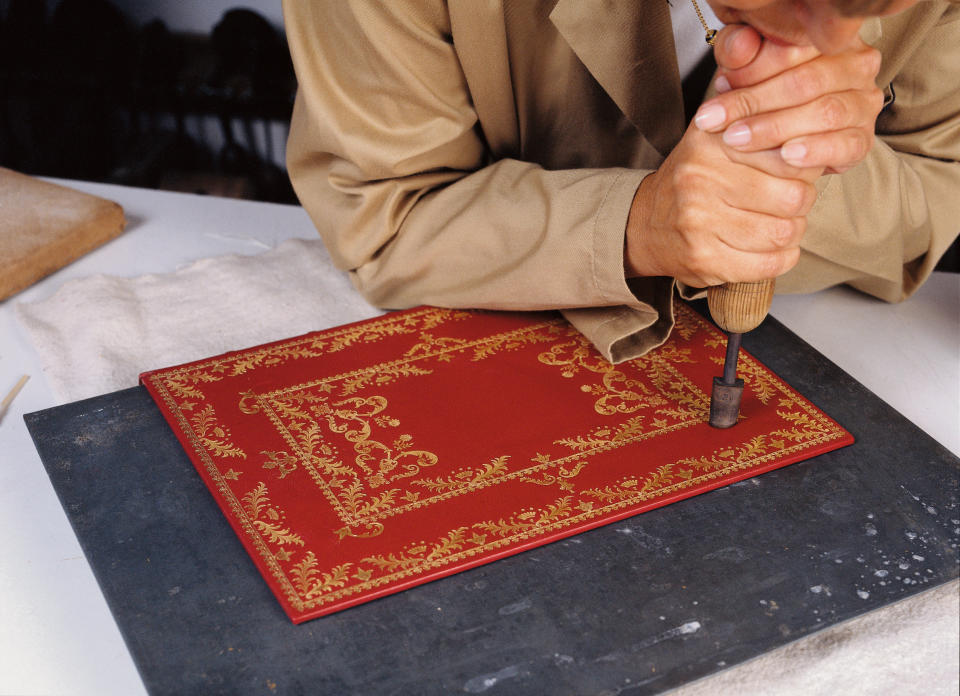Michelangelo Foundation, Jaeger-LeCoultre Facilitating Transmission of Craftsmanship

MILAN — The Michelangelo Foundation is launching a new education program, the Homo Faber Fellowship, in partnership with Jaeger-LeCoultre.
“The fellowship was conceived to facilitate the transmission of skills from master artisans to young talents, helping them to take their first step in a profession in the craft sector,” said Alberto Cavalli, executive director of the foundation. The partnership stems from “a shared vision for the future of craftsmanship,” as the fellowship includes professional mentoring.
More from WWD
Farfetch Said to Be Mulling Browns Sale as Credit Rating Takes Hit
A. Lange & Söhne Inaugurates Paris Flagship as Watchmaker Tightens Retail Network
Cavalli underscored that it is key to “create the cultural conditions, an ecosystem that cannot deceive young people, we must work on the culture of beauty, the appreciation and the awareness of manual work. We must trigger curiosity toward the product but also toward the process. What is behind it? It’s easy in this social media era to put a ‘like’ under a beautiful product but can we consider a product beautiful if behind it there is a history of horror? I think not.”
This is why the Michelangelo Foundation is a cultural association, he noted, lamenting the still current “stigma and paternalism” toward manual and artisanal craftsmanship. On the contrary, master artisans “create beautiful objects, enter in contact with very interesting clients, heads of state, they are ambassadors of culture, they enter in the most beautiful houses in the world and there will always be an elite of individuals who desire special, unique, durable objects with a history,” Cavalli remarked.
Speaking at the Cologni Foundation in Milan, Cavalli said the association has been financing the project “Una scuola, un lavoro [A school, a job]” for the past 10 years, supporting six-month training experiences in Italy and helping more than 300 young artisans secure work — a sort of precursor of the Homo Faber Fellowship, he said.
The seven-month fellowship, launched in September, incorporates a monthlong entrepreneurial and creative masterclass certified by the ESSEC Business School and delivered together with Passa Ao Futuro and a six-month sponsored placement in the workshop of a master artisan until March 24.
The generational handover and the preservation of manual, skilled craftsmanship have become key issues in Italy, where Altagamma estimates that within five years its members will need to hire 346,000 new artisans and technicians.
According to a study by Comité Colbert in France, 20,000 manual positions are currently vacant among their 93 members. The study Ateliers d’Art de France revealed that 94 percent of master artisans do not train an apprentice, although the actual number of students trained in manual work and craftsmanship is not sufficient to cover demand.
The Michelangelo Foundation for Creativity and Craftsmanship is a nonprofit institution based in Geneva, which champions contemporary craftspeople worldwide and fosters a cultural movement through the international exhibition Homo Faber. The event is organized by the Michelangelo Foundation established by Compagnie Financière Richemont’s chairman Johann Rupert and Italian entrepreneur Franco Cologni with the mission to promote, encourage and preserve fine craftsmanship in different fields.
Cavalli said that, based on a recent survey carried out on the community of 3,000 Homo Faber artisans, more than 85 percent work alone in a mono-structure.
It’s a matchmaking of sort, said Cavalli, as the foundation pays the expenses of the young trainees, pairing them with the artisans, ranging from engravers and cabinet-makers to embroiderers.
The first edition of the Homo Faber Fellowship kicked off in September and selected 21 couples, taking place in workshops of master artisans from Spain, Portugal, France, Ireland and Greece, with 15 crafts and 10 nationalities represented, in a partnership with local members of the international network of the foundation. The inaugural masterclass took place at Joana Vasconcelos’ studio in Lisbon.

Cavalli said the next steps for 2024 include monitoring the impact of the program, integrating artisans and fellows to the Homo Faber community. The plan is to stage exhibitions to showcase co-created objects with Homo Faber 2024 and to support the business development of duos through a partner company. A second edition is expected to take place in 10 countries with 20 to 30 couples.
Cavalli underscored that the scholarship “seeks to make crafts culturally, economically and socially relevant for students of applied arts and crafts.”
The partnership with Jaeger-LeCoultre, which is owned by Richemont, builds on its existing in-house apprenticeship programs that have taken place for more than 30 years.
In 2021, the house inaugurated a new training center dedicated not only to watchmaking but also to related occupations such as micro-engineering, quality control, sales and customer service. “The training has nothing to do with watchmaking, so their effort is pure patronage,” Cavalli said of the company’s support of the Homo Faber Fellowship.
“The goal is to create a model that stimulates change and growth in the craft sector and responds to job openings,” said Cavalli, providing them with practical and business skills to pursue a sustainable career in the craft sector. The young artisans are drawn by “the perception that through manual craftsmanship they can express themselves in an authentic way,” he remarked.
The fellowship is open to applied arts and crafts graduates who are looking to become a professional artisan and will favor master artisans whose craft has a strong connection to the local area, in an attempt to support cultural heritage.
The seven-month fellowship incorporates a monthlong entrepreneurial masterclass developed and certified by ESSEC Business School at Joana Vasconcelos’ studio, in addition to a six-month placement for practical skills acquisition in the workshop of a master artisan and mentoring will be provided by designers or communication specialists, for example.
Best of WWD


